
- Updated 2024.5.16 16:06
- All Articles
-
member
icon
-
facebook
cursor
-
twitter
cursor
|
CommunityInterviews |
'Seeing, hearing, moving' to Jeju's nature and charmsThe Weekly chats with Seogwipo music producer Yoo Hee Jong |
|
| |
 |
|
| ▲ Music producer Yoo Hee Jong working in a studio in Seogwipo. Photo by Øyvind Renberg |
Music producer and Fortune Cookie band-member Yoo Hee Jong was sick of the noise in Seoul, so after living there for some 30-odd years, he relocated to sunny Seogwipo City two years ago, where he now listens to the sea everyday, plays his guitar on the beach, and strolls through the island’s lush forests. These experiences inspired his sensibility for Jeju.
After a year and a half of work Yoo and six of his friends (like him, newcomers to the island) have completed a six-song album titled “5 Days Market Project.” The different personalities of each artist are reflected in the music, with the songs ranging from soft folk to electronic pop. Four of the works are in English.
For more information, go to Facebook.com/5daysmarketproject.
The following is The Weekly’s recent email interview with Yoo. It was translated from Korean and edited.
| |
 |
|
| ▲ Some of the people who participated in the “5 Days Market Project.” Photo by Kim Shang Tae |
How did your music career come into being?
When I was studying Visual Communication Design at university, I became absorbed in the production of visual art. I had to make music with my computer to suit the videos I created, and this made me more interested in making music than the video itself. After graduating, I spent two years shut in a studio making Fortune Cookie’s first album “Beginning of Fortune” which was released in 2004, this was the [official] starting point of my musical career. When I think of that time, I remember accepting everything I could, willy-nilly.
What genre of music do you want to produce?
I mainly listen to psychedelic, jazz, electronic, folk, indie pop. I usually respond to music that is dreamlike, melancholic, temperate, and soulful. And I also want to make music with that kind of sound. When I search for my favorite contemporary artists on sites like Allmusic.com or Pitchfork.com, they are usually categorized as alternative/ambient pop or indie folk. I think I’m also similar to those genres, if I am asked to categorize my music.
How did you come to Jeju?
When I finished working on Fortune Cookie’s first album, and before it had been released, I visited Jeju for the first time. The scenery and the atmosphere of Jeju at that time were overwhelming. My mind overflowed with new ambition and ideas and I thought that I would like to work in Jeju someday. However, I had to go back to the dry city life [of Seoul].
After that, in 2008, I suffered from several difficulties. Though I went on a trip to India to escape from my troubles, when I returned I became very sick. I desired a healthier and mentally richer life and I decided [to move to] Jeju Island. At that time, my partner in Fortune Cookie, Hong Bo Ram, was in Seogwipo City, as a resident artist at the Lee Joong Seop Gallery, so I came here with just a few things including my guitar, a notebook, my keyboard, and an empty mind.
Is there any particular reason you chose to live in Seogwipo City?
I was born in Seoul and lived there for 30 years. Maybe that’s why I prefer to live sin a single house with a yard rather than an apartment; the countryside to the city. Also, some of my friends lived in Seogwipo City. So Beophwan village was the best place. After spending two years in a house that was too hot in the summer and too cold in the winter, I moved into an apartment in the next town. Partly, I’m worried that I’m getting stuck with modern conveniences, becoming passive, and repeating [my old] patterns again.
How does Jeju inspire your music?
I go to see the sea every day. I walk a lot. I see, hear, move, and respond a lot. What tormented me most in Seoul was its sound. I was always surrounded by noise and I couldn’t focus on listening. I regained the joy of putting an LP on a turntable and listening deeply to music, sitting on a sofa. Relaxing and focusing on music has a good effect on the sound I make. In Seoul, I always listened to Underworld’s music on my iPod but now when I walk I frequently listen to Nick Drake or Joni Mitchell, which I never imagined doing on a subway in Seoul. Isn’t it the influence of environment?
Why did you name this album “5 Days Market Project?”
The [album’s] process was very relaxing because every song was made with new friends. Also, I had limited instruments and track numbers, so we took many breaks [during production]. I thought that this attitude was more similar to the image of a five-day market than an Emart or HomePlus.
Another important feature of this album, different from that of Fortune Cookie, was every track had very different characteristics depending on the performers collaborating, who also had no previous experience with recording, except Hong Bo Ram. That became an important motive for me. It was like finding fresh and unprocessed ingredients for food in the five-day market.
How did you meet the collaborating artists?
In the rainy season of 2010, I was making a song called “Monsoon Laundry” for fun with Øyvind Renberg who visited Jeju. When looking for a female voice for the chorus, I watched a performance by Lobster Band in Mirru Namu café in Seogwipo, which consists of foreign [English] teachers and Seogwipo citizens. When I heard Jenna’s and Carolyn’s voices, I felt I want to work with different types of people.
How long did you prepare for this album?
It took one and a half years from the point of meeting Jenna and Carolyn. As I mentioned before, it was a very relaxing process. We also had our other jobs to earn money. In addition, we had to use a new recording system and underwent many trial and errors. The actual time we were absorbed in work in the studio was four months before the release of the album.
What did you want to achieve with this album?
I wanted to put in my album the real image of my other self of a child swimming, warming myself at the fire, playing the guitar and singing, [this was the self] I found in Jeju in my mid-30s.
But I was a producer. I had to make the frame to put the unprocessed ingredients unified and had to learn about the technique. So I always felt a burden and stress when I was alone in a studio.
However, I’m feeling satisfied now in that I put my expectation aside and stuck to my goal to work joyfully.
What is your favorite among the songs included in this album? Is there any song with a special story?
The sixth song ‘The Boy and the Sea’ was completed last. When I was making it, I found that what I intended first were reflected into the song naturally and unconsciously. Yoo Gwang Kook and I had a close bond, too. I’m satisfied. In addition, through the arrangement of the fourth song Over & Gone, I felt the attraction of small and simple things.
Even though I have many things to improve in detail, I gained confidence from this album. It means a lot to me.
Do you have any future plans to do other projects on Jeju?
With the Oiljang Record, which I made myself for this album, I plan to make a 5 Days Market Project album every year. The Project 2, 3, 4, etc. will be made with other artists. I also want to find my personal soundscape and visual. In that respect, Jeju is a good place for me, like the environment of the island was for the group Sigur Ros, and the foggy city landscape of Bristol was for Massive Attack. That will be proven by future sole or band activity, maybe.
Tell me about your dream.
My dream is to dream constantly till death, with keeping my pace, not chasing my desire on achievement or development. Even though I really enjoy swimming in the sea more than anyone, I don’t want to take a mistake to be drowned from greed or [be swept out] to a far islet. I also don’t want to drift to a place I didn’t want to go.
When I get bored with all these things, I wish to be a white-haired old man.
|
|
|
|
|
|
|
|
ⓒ Jeju Weekly 2009 (http://www.jejuweekly.net)
All materials on this site are protected under the Korean Copyright Law and may not be reproduced, distributed, transmitted, displayed, published without the prior consent of Jeju Weekly. |
|
|
|
|
| Jeju-Asia's No.1 for Cruise |
|
|
|
Title:The jeju Weekly(제주위클리) | Mail to editor@jejuweekly.net | Phone: +82-64-724-7776 Fax: +82-64-724-7796
#503, 36-1, Seogwang-ro, Jeju-si, Jeju-do, Korea, 63148
Registration Number: Jeju, Ah01158(제주,아01158) | Date of Registration: November 10,2022 | Publisher&Editor : Hee Tak Ko | Youth policy: Hee Tak Ko
Copyright ⓒ 2009 All materials on this site are protected under the Korean Copyright Law and may not be reproduced, distributed, transmitted, displayed, published
without the prior consent of jeju weekly.com.

|





















